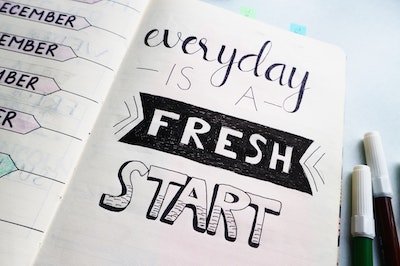When do I use the words: “every day”?
“Every day may not be good
The words every day describe the frequency of something. The word every is a determiner which specifies quantity; the word day is a noun. When these two words are used together, they become the adverbial phrase every day, which modifies a verb to add detail about when, how, how often, and to what extent. Every day means daily, day to day, each day, every single day. For example:
(In this sentence, every day modifies the verb learn, giving us information about “when” we should learn something new.)

Correct! The verb called is modified by every day, giving us information about “when” the sisters called each other.
Can I use “each day” instead of “every day”?
These two phrases have different words but are usually close in meaning. However, at times, there are small differences in their meaning.
In the following example, both sentences are grammatically correct, both are adverbial phrases that modify the verb, and both are interchangeable:
They go to school every day.
They go to school each day.
They go to school nearly every day.
But….when we replace every day with each day:
They go to school nearly each day.
Now your turn. Can each day and every day be used interchangeably in the following two sentences?
The answer: No, they can not be interchanged. The second sentence is incorrect and should not be used.
Can I use “daily” instead of “every day”?
The gym is open daily except on Sundays.
In addition, some people have differentiated between daily and every day by defining daily as a word used in commercial or official instances. And many people agree that the phrase, “on a daily basis” is wordy, redundant, and should not be used under any circumstances.
When do I use the word “everyday”?
“Sometimes I'm right and I can be wrong
My own beliefs are in my song
The butcher, the banker, the drummer and then
Makes no difference what group I'm in
I am everyday people.”
The word everyday is an adjective which usually describes or modifies a noun. It is a single word that means something common, normal, regular, used routinely, commonplace, or ordinary.
For example:
What is our conclusion?
Although every day and everyday are often used interchangeably in writing, we have seen that this is a mistake: their meanings are altogether different.
If you are confused, a quick trick to substitute the adjective “regular” for the adjective “everyday”, or to substitute the adverbial phrase “each day” for “every day”. Speak the sentence out loud to hear how it sounds. Usually, you will be easily able to tell if the phrase is correct.
But try not to make it an everyday practice - the differences between the two are not hard to learn.








Have a discussion about this article with the community:
Report Comment
We're doing our best to make sure our content is useful, accurate and safe.
If by any chance you spot an inappropriate comment while navigating through our website please use this form to let us know, and we'll take care of it shortly.
Attachment
You need to be logged in to favorite.
Log In